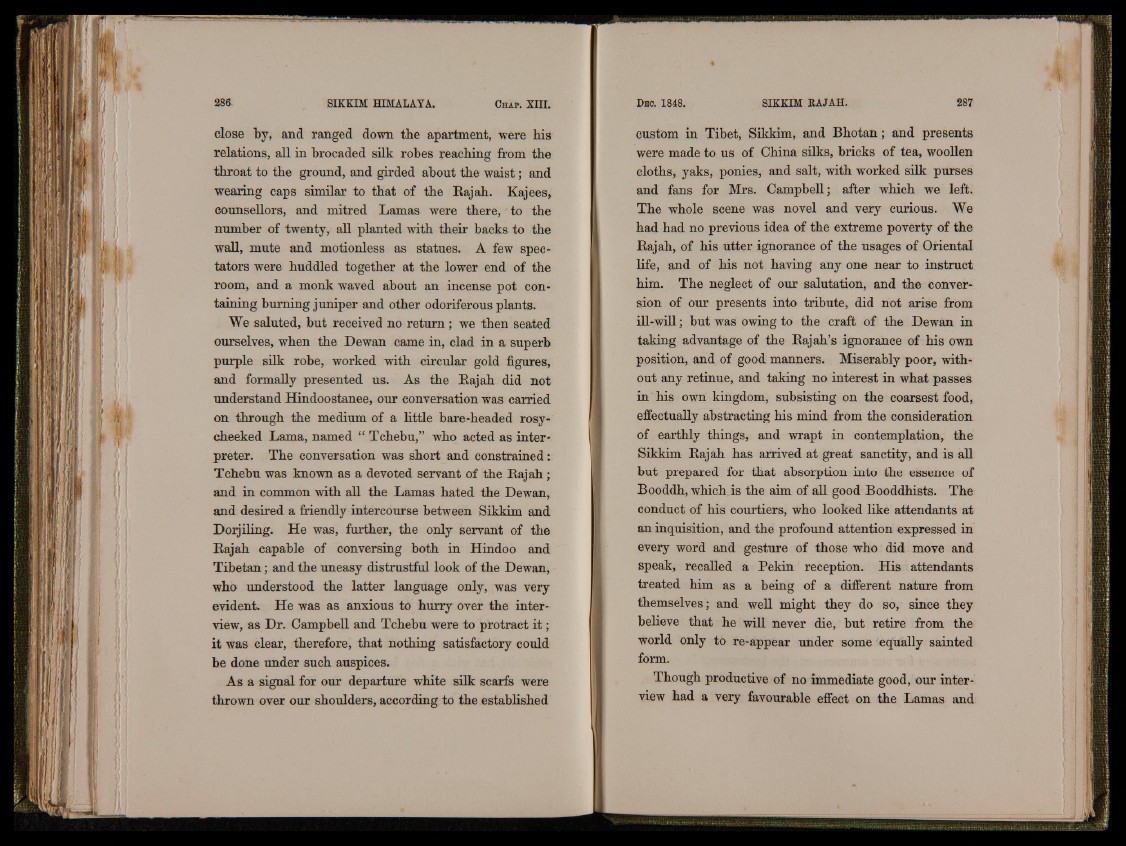
close by, and ranged down the apartment, were his
relations, all in brocaded silk robes reaching from the
throat to the ground, and girded about the waist; and
wearing caps similar to that of the Rajah. Kajees,
counsellors, and mitred Lamas were there, to the
number of twenty, all planted with their backs to the
wall, mute and motionless as statues. A few spectators
were huddled together at the lower end of the
room, and a monk waved about an incense pot containing
burning juniper and other odoriferous plants.
We saluted, but received no retu rn ; we then seated
ourselves, when the Dewan came in, clad in a superb
purple silk robe, worked with circular gold figures,
and formally presented us. As the Rajah did not
understand Hindoostanee, our conversation was carried
on through the medium of a little bare-headed rosy-
cheeked Lama, named “ Tchebu,” who acted as interpreter.
The conversation was short and constrained:
Tchebu was known as a devoted servant of the Rajah;
and in common with all the Lamas hated the Dewan,
and desired a friendly intercourse between Sikkim and
Dorjiling. He was, further, the only servant of the
Rajah capable of conversing both in Hindoo and
Tibetan; and the uneasy distrustful look of the Dewan,
who understood the latter language only, was very
evident. He was as anxious to hurry over the interview,
as Dr. Campbell and Tchebu were to protract i t ;
it was clear, therefore, that nothing satisfactory could
be done under such auspices.
As a signal for our departure white silk scarfs were
thrown over our shoulders, according to the established
custom in Tibet, Sikkim, and Bhotan; and presents
were made to us of China silks, bricks of tea, woollen
cloths, yaks, ponies, and salt, with worked silk purses
and fans for Mrs. Campbell; after which we left.
The whole scene was novel and very curious. We
had had no previous idea of the extreme poverty of the
Rajah, of his utter ignorance of the usages of Oriental
life, and of his not having any one near to instruct
him. The neglect of our salutation, and the conversion
of our presents into tribute, did not arise from
ill-will; but was owing to the craft of the Dewan in
taking advantage of the Rajah’s ignorance of his own
position, and of good manners. Miserably poor, without
any retinue, and taking no interest in what passes
in his own kingdom, subsisting on the coarsest food,
effectually abstracting his mind from the consideration
of earthly things, and wrapt in contemplation, the
Sikkim Rajah has arrived at great sanctity, and is all
but prepared for that absorption into the essence of
Booddh, which is the aim of all good Booddhists. The
conduct of his courtiers, who looked like attendants at
an inquisition, and the profound attention expressed in
every word and gesture of those who did move and
speak, recalled a Pekin reception. His attendants
treated him as a being of a different nature from
themselves; and well might they do so, since they
believe that he will never die, but retire from the
world only to re-appear under some equally sainted
form.
Though productive of no immediate good, our interview
had a very favourable effect on the Lamas and